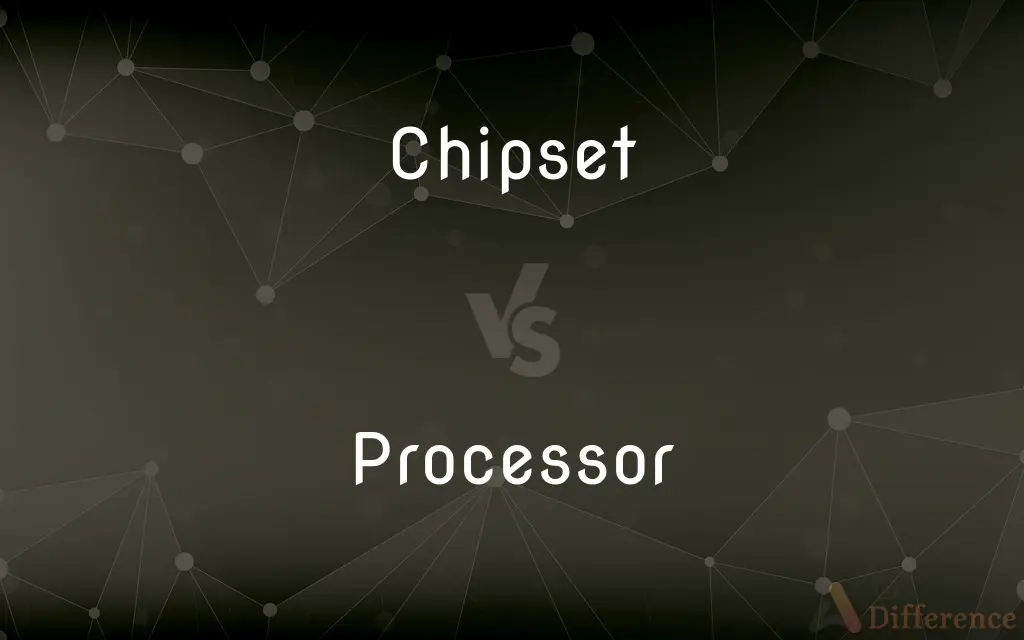Chipset vs. Processor — What's the Difference?
Edited by Tayyaba Rehman — By Urooj Arif — Updated on March 18, 2024
A chipset acts as a communication hub between the processor and external devices, managing data flow within a computer, while a processor, or CPU, executes instructions from software and processes data.

Difference Between Chipset and Processor
Table of Contents
ADVERTISEMENT
Key Differences
The processor, or Central Processing Unit (CPU), is the primary component of a computer that performs calculations, runs programs, and processes data. It's often referred to as the brain of the computer, executing instructions from software applications. On the other hand, a chipset serves as the computer's communication center, connecting the processor to other components such as memory, storage, and peripheral devices. It plays a crucial role in determining which features and technologies a motherboard supports.
While the processor executes instructions and performs calculations necessary for operating systems and applications to function, the chipset manages the flow of data between the processor and other system components. It ensures that the processor can communicate effectively with the memory (RAM), storage devices (such as SSDs and HDDs), and expansion cards. Chipsets can influence the system's performance, compatibility with hardware, and overall efficiency, whereas the processor's speed, architecture, and capabilities directly impact the computer's ability to run complex software and perform multiple tasks simultaneously.
Modern processors integrate more functionality that was traditionally handled by the chipset, such as memory controllers and graphics processing units (GPUs). This integration can lead to improved performance and power efficiency, as data does not have to travel as far between the processor and these components. However, chipsets still play a vital role in connecting additional peripherals, managing data bandwidth for these connections, and supporting various interface standards.
Chipsets are designed to work with specific processor families and sockets, ensuring that the motherboard can support the installed CPU's features, such as overclocking capabilities and multi-GPU configurations. The compatibility between a processor and chipset is crucial for the stable operation of a computer system. In contrast, the processor's compatibility with software applications depends on its architecture, instruction set, and processing power.
The development of both processors and chipsets is driven by advancements in semiconductor technology, with each new generation aiming to provide higher speed, greater efficiency, and support for new hardware and software standards. While the processor focuses on faster execution of instructions and processing more data in parallel, chipsets evolve to support new storage standards, faster USB and Ethernet connections, and other innovations that enhance the overall functionality and connectivity of computers.
ADVERTISEMENT
Comparison Chart
Function
Manages data flow between the CPU and other components.
Executes instructions and processes data.
Primary Role
Serves as a communication hub within the computer.
Acts as the brain of the computer, running programs and performing calculations.
Impact on Performance
Influences system compatibility, expansion capabilities, and efficiency of data transfer.
Directly affects the speed and efficiency of software execution.
Compatibility
Must support the installed CPU and connected devices.
Must match the motherboard's socket and chipset.
Integration
Primarily responsible for connecting peripheral devices and managing data bandwidth.
Modern CPUs integrate features like memory controllers and GPUs.
Compare with Definitions
Chipset
A set of electronic components in an integrated circuit that manages data flow between the processor, memory, and peripherals.
The motherboard's chipset determines its compatibility with various processors.
Processor
The primary component that performs arithmetic and logical operations.
Upgrading the processor improved the computer's overall performance.
Chipset
Dictates the motherboard's expansion capabilities.
The chipset determines how many PCIe slots are available for graphics cards.
Processor
A chip that interprets and executes instructions from applications.
The processor's speed is a key factor in multitasking efficiency.
Chipset
Controls communication between the processor and external devices.
A high-end chipset supports faster memory and storage speeds.
Processor
An integrated circuit that processes data.
Modern processors support advanced features like virtualization and encryption.
Chipset
Manages the interface standards and bandwidth for connected devices.
The latest chipset supports Wi-Fi 6 and multiple M.2 slots for SSDs.
Processor
A central processing unit that executes computer programs.
The latest processor can handle billions of instructions per second.
Chipset
The infrastructure of the motherboard supporting various features.
The chipset enables connectivity options like USB 3.0 and SATA 6Gb/s.
Processor
The core of computing devices, running the operating system and applications.
A powerful processor is essential for gaming and professional software.
Chipset
In a computer system, a chipset is a set of electronic components in an integrated circuit known as a "Data Flow Management System" that manages the data flow between the processor, memory and peripherals. It is usually found on the motherboard.
Processor
A machine that processes something
The processor overexposed the film
Chipset
(computing) A group of integrated circuits ("chips") that are designed to work together, and are usually marketed as a single product.
Processor
One that processes, especially an apparatus for preparing, treating, or converting material
A wood pulp processor.
Processor
A computer.
Processor
A central processing unit.
Processor
A program that translates another program or a data file into a form acceptable by the computer being used.
Processor
A person or institution who processes things (foods, photos, applications, etc.).
He is a loan processor with a bank.
Processor
A device which processes, which changes something (a computer processor, food processor, etc.).
The food processor shredded the vegetables.
Processor
A central processing unit.
This mainframe's processor is fast.
Processor
A microprocessor.
This computer has two processors, but only one keyboard.
Processor
A business engaged in processing agricultural products and preparing them for market
Processor
Someone who processes things (foods or photographs or applicants etc.)
Processor
(computer science) the part of a computer (a microprocessor chip) that does most of the data processing; the CPU and the memory form the central part of a computer to which the peripherals are attached
Common Curiosities
How do a processor and chipset work together?
The processor executes instructions and processes data, while the chipset manages the flow of this data between the processor and other system components, ensuring efficient communication and operation.
What is a chipset?
A chipset is an integrated circuit on a motherboard that manages data flow between the processor, memory, and peripheral devices, facilitating communication within the computer.
What is a processor?
A processor, or CPU, is the main chip in a computer that performs instructions and processes data, allowing software to run.
Can you upgrade a processor independently of the chipset?
Upgrading a processor may require a compatible chipset; therefore, it's important to ensure the new CPU is supported by the motherboard's chipset.
What factors should be considered when choosing a processor and chipset?
Consider the intended use (e.g., gaming, professional work), compatibility with other components, support for future upgrades, and features such as connectivity options and expansion capabilities.
Can a chipset limit the performance of a processor?
A chipset can limit the overall system performance by restricting the speed of connected devices, though it does not directly affect the processor's speed.
How often do processor and chipset technologies advance?
Processor and chipset technologies advance regularly, with new generations typically released every 1-2 years, offering improved performance, efficiency, and features.
Do chipsets affect gaming performance?
While the processor significantly impacts gaming performance, the chipset can influence it indirectly by determining support for graphics cards, RAM speed, and other peripherals.
Are all processors compatible with all chipsets?
No, processors require compatible chipsets that support their architecture and features. Compatibility information is provided by the motherboard and processor manufacturers.
How does the integration of features into processors change their relationship with chipsets?
As processors integrate more features like memory controllers and GPUs, the chipset's role shifts towards supporting peripheral connectivity and expansion rather than basic communication functions.
Share Your Discovery

Previous Comparison
Distinguished vs. Famous
Next Comparison
Dust vs. AshAuthor Spotlight
Written by
Urooj ArifUrooj is a skilled content writer at Ask Difference, known for her exceptional ability to simplify complex topics into engaging and informative content. With a passion for research and a flair for clear, concise writing, she consistently delivers articles that resonate with our diverse audience.
Edited by
Tayyaba RehmanTayyaba Rehman is a distinguished writer, currently serving as a primary contributor to askdifference.com. As a researcher in semantics and etymology, Tayyaba's passion for the complexity of languages and their distinctions has found a perfect home on the platform. Tayyaba delves into the intricacies of language, distinguishing between commonly confused words and phrases, thereby providing clarity for readers worldwide.
















































